中国文化翻译练习10篇(3)
- 格式:doc
- 大小:58.00 KB
- 文档页数:15
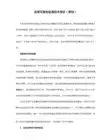
一、对龙图腾的崇拜在中国大约已绵延了八千多年。
中国龙是古人将鱼、蛇、马、牛等动物与云雾、雷电等自然天象集合而成的一种神物。
中国龙的形成与中华民族的多元融合过程同步。
在中国人的心目中,龙具有开拓变化和团结凝聚的寓意。
(1) 对龙图腾的崇拜在中国大约已绵延了八千多年。
Chinese Dragon totem worship in China has been aroundfor over 8,000 years.(2) 中国龙是古人将鱼、蛇、马、牛等动物与云雾、雷电等自然天象集合而成的一种神物。
The ancients in China considered the dragon (or loong) as a fetish thatcombine s animals including the fish, snake, horse and ox with cloud, thunder, lightning and other natural celestial phenomena. (3) 中国龙的形成与中华民族的多元融合过程同步。
The Chinese dragon was formedin accordance with the multicultural fusion process of the Chinese nation.(4) 在中国人的心目中,龙具有开拓变化和团结凝聚的寓意。
To the Chinese, the dragon signifies innovation and cohesion.二、秧歌舞是中国汉族的一种民间传统舞蹈,通常在北方省份表演。
秧歌舞者通常穿上明亮多彩的表演服装,他们的表演动作有力迅速。
在农历春节、元宵节等节日期间,人们一旦听到锣鼓声,不管外面天气有多冷,他们都会蜂拥到街上看秧歌舞表演。
近年来,中国东北某些城市的老年人自发组织了了秧歌队,队员常年通过跳秧歌舞来保持健康,同时他们也乐在其中。
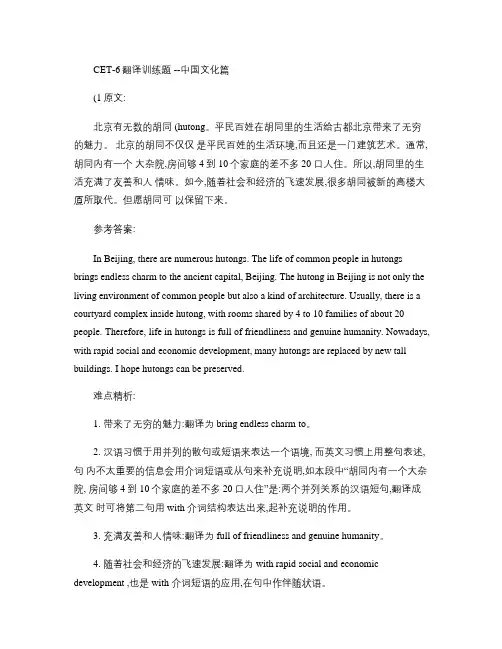
CET-6翻译训练题 --中国文化篇(1原文:北京有无数的胡同 (hutong。
平民百姓在胡同里的生活给古都北京带来了无穷的魅力。
北京的胡同不仅仅是平民百姓的生活环境,而且还是一门建筑艺术。
通常,胡同内有一个大杂院,房间够 4到 10个家庭的差不多 20 口人住。
所以,胡同里的生活充满了友善和人情味。
如今,随着社会和经济的飞速发展,很多胡同被新的高楼大厦所取代。
但愿胡同可以保留下来。
参考答案:In Beijing, there are numerous hutongs. The life of common people in hutongs brings endless charm to the ancient capital, Beijing. The hutong in Beijing is not only the living environment of common people but also a kind of architecture. Usually, there is a courtyard complex inside hutong, with rooms shared by 4 to 10 families of about 20 people. Therefore, life in hutongs is full of friendliness and genuine humanity. Nowadays, with rapid social and economic development, many hutongs are replaced by new tall buildings. I hope hutongs can be preserved.难点精析:1. 带来了无穷的魅力:翻译为 bring endless charm to。
2. 汉语习惯于用并列的散句或短语来表达一个语境, 而英文习惯上用整句表述,句内不太重要的信息会用介词短语或从句来补充说明,如本段中“胡同内有一个大杂院, 房间够 4到 10个家庭的差不多 20口人住”是:两个并列关系的汉语短句,翻译成英文时可将第二句用 with 介词结构表达出来,起补充说明的作用。
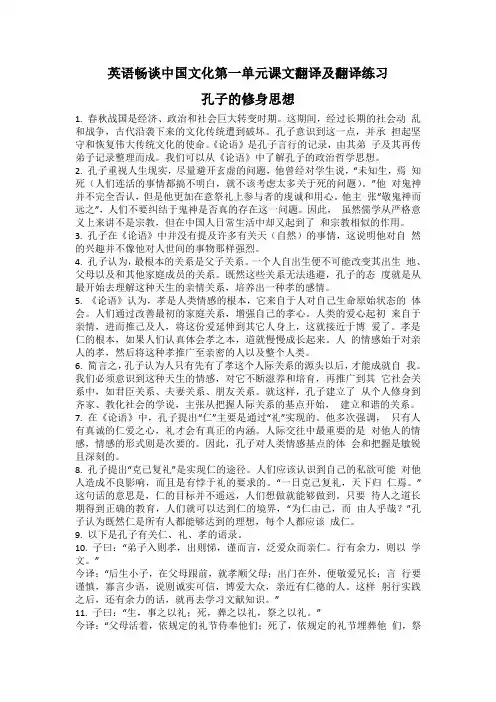
英语畅谈中国文化第一单元课文翻译及翻译练习孔子的修身思想1. 春秋战国是经济、政治和社会巨大转变时期。
这期间,经过长期的社会动乱和战争,古代沿袭下来的文化传统遭到破坏。
孔子意识到这一点,并承担起坚守和恢复伟大传统文化的使命。
《论语》是孔子言行的记录,由其弟子及其再传弟子记录整理而成。
我们可以从《论语》中了解孔子的政治哲学思想。
2. 孔子重视人生现实,尽量避开玄虚的问题,他曾经对学生说,“未知生,焉知死(人们连活的事情都搞不明白,就不该考虑太多关于死的问题)。
”他对鬼神并不完全否认,但是他更加在意祭礼上参与者的虔诚和用心。
他主张“敬鬼神而远之”,人们不要纠结于鬼神是否真的存在这一问题。
因此,虽然儒学从严格意义上来讲不是宗教,但在中国人日常生活中却又起到了和宗教相似的作用。
3. 孔子在《论语》中并没有提及许多有关天(自然)的事情,这说明他对自然的兴趣并不像他对人世间的事物那样强烈。
4. 孔子认为,最根本的关系是父子关系。
一个人自出生便不可能改变其出生地、父母以及和其他家庭成员的关系。
既然这些关系无法逃避,孔子的态度就是从最开始去理解这种天生的亲情关系,培养出一种孝的感情。
5. 《论语》认为,孝是人类情感的根本,它来自于人对自己生命原始状态的体会。
人们通过改善最初的家庭关系,增强自己的孝心。
人类的爱心起初来自于亲情,进而推己及人,将这份爱延伸到其它人身上,这就接近于博爱了。
孝是仁的根本,如果人们认真体会孝之本,道就慢慢成长起来。
人的情感始于对亲人的孝,然后将这种孝推广至亲密的人以及整个人类。
6. 简言之,孔子认为人只有先有了孝这个人际关系的源头以后,才能成就自我。
我们必须意识到这种天生的情感,对它不断滋养和培育,再推广到其它社会关系中,如君臣关系、夫妻关系、朋友关系。
就这样,孔子建立了从个人修身到齐家、教化社会的学说,主张从把握人际关系的基点开始,建立和谐的关系。
7. 在《论语》中,孔子提出“仁”主要是通过“礼”实现的。
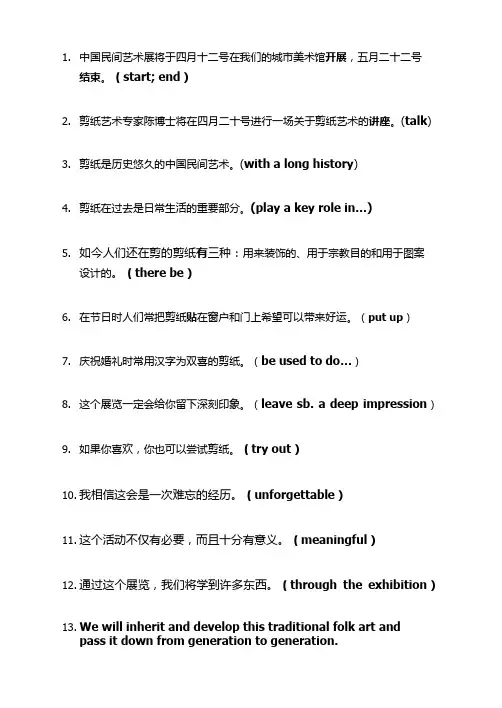
1.中国民间艺术展将于四月十二号在我们的城市美术馆开展,五月二十二号
结束。
(start; end)
2.剪纸艺术专家陈博士将在四月二十号进行一场关于剪纸艺术的讲座。
(talk)
3.剪纸是历史悠久的中国民间艺术。
(with a long history)
4.剪纸在过去是日常生活的重要部分。
(play a key role in…)
5.如今人们还在剪的剪纸有三种:用来装饰的、用于宗教目的和用于图案
设计的。
(there be)
6.在节日时人们常把剪纸贴在窗户和门上希望可以带来好运。
(put up)
7.庆祝婚礼时常用汉字为双喜的剪纸。
(be used to do…)
8.这个展览一定会给你留下深刻印象。
(leave sb. a deep impression)
9.如果你喜欢,你也可以尝试剪纸。
(try out)
10.我相信这会是一次难忘的经历。
(unforgettable)
11.这个活动不仅有必要,而且十分有意义。
(meaningful)
12.通过这个展览,我们将学到许多东西。
(through the exhibition)
13.We will inherit and develop this traditional folk art and
pass it down from generation to generation.。
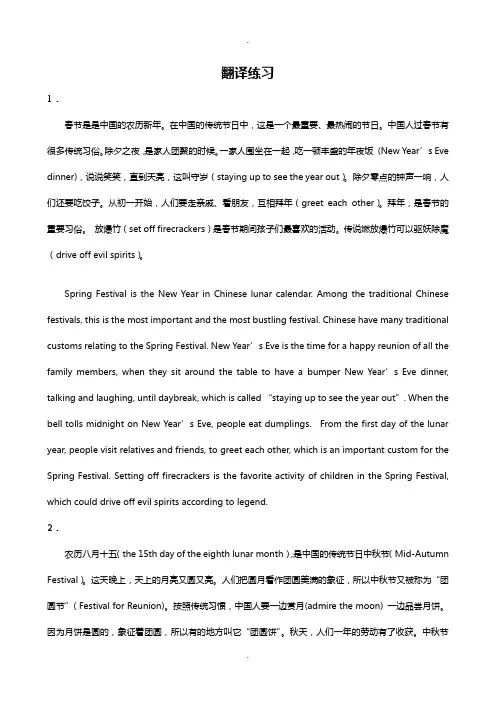
翻译练习1.春节是是中国的农历新年。
在中国的传统节日中,这是一个最重要、最热闹的节日。
中国人过春节有很多传统习俗。
除夕之夜,是家人团聚的时候。
一家人围坐在一起,吃一顿丰盛的年夜饭(New Year’s Eve dinner),说说笑笑,直到天亮,这叫守岁(staying up to see the year out)。
除夕零点的钟声一响,人们还要吃饺子。
从初一开始,人们要走亲戚、看朋友,互相拜年(greet each other)。
拜年,是春节的重要习俗。
放爆竹(set off firecrackers)是春节期间孩子们最喜欢的活动。
传说燃放爆竹可以驱妖除魔(drive off evil spirits)。
Spring Festival is the New Year in Chinese lunar calendar. Among the traditional Chinese festivals, this is the most important and the most bustling festival. Chinese have many traditional customs r elating to the Spring Festival. New Year’s Eve is the time for a happy reunion of all the family members, when they sit around the table to have a bumper New Year’s Eve dinner, talking and laughing, until daybreak, which is called “staying up to see the year out”. When the bell tolls midnight on New Year’s Eve, people eat dumplings. From the first day of the lunar year, people visit relatives and friends, to greet each other, which is an important custom for the Spring Festival. Setting off firecrackers is the favorite activity of children in the Spring Festival, which could drive off evil spirits according to legend.2.农历八月十五(the 15th day of the eighth lunar month),是中国的传统节日中秋节(Mid-Autumn Festival)。
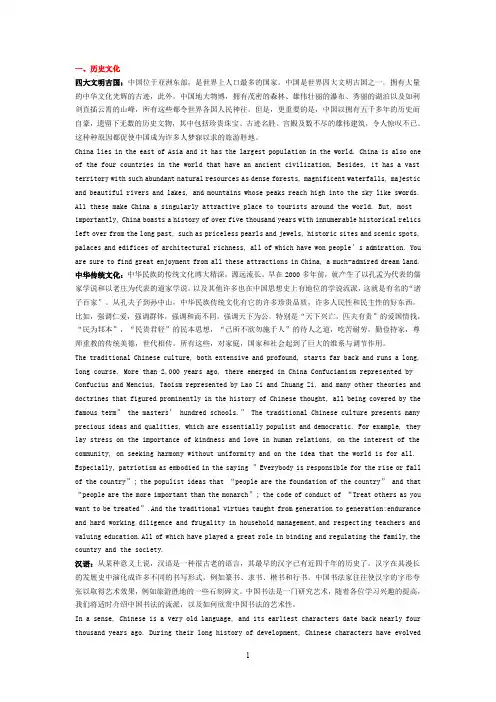
一、历史文化四大文明古国:中国位于亚洲东部,是世界上人口最多的国家。
中国是世界四大文明古国之一,拥有大量的中华文化光辉的古迹,此外,中国地大物博,拥有茂密的森林、雄伟壮丽的瀑布、秀丽的湖泊以及如利剑直插云霄的山峰,所有这些都令世界各国人民神往。
但是,更重要的是,中国以拥有五千多年的历史而自豪,遗留下无数的历史文物,其中包括珍贵珠宝、古迹名胜、宫殿及数不尽的雄伟建筑,令人惊叹不已。
这种种原因都促使中国成为许多人梦寐以求的旅游胜地。
China lies in the east of Asia and it has the largest population in the world. China is also one of the four countries in the world that have an ancient civilization, Besides, it has a vast territory with such abundant natural resources as dense forests, magnificent waterfalls, majestic and beautiful rivers and lakes, and mountains whose peaks reach high into the sky like swords. All these make China a singularly attractive place to tourists around the world. But, most importantly, China boasts a history of over five thousand years with innumerable historical relics left over from the long past, such as priceless pearls and jewels, historic sites and scenic spots, palaces and edifices of architectural richness, all of which have won people’s admiration. You are sure to find great enjoyment from all these attractions in China, a much-admired dream land. 中华传统文化:中华民族的传统文化博大精深,源远流长。
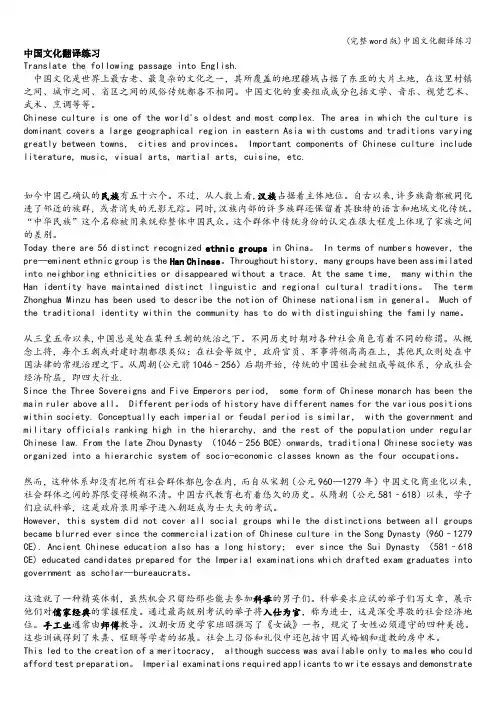
中国文化翻译练习Translate the following passage into English.中国文化是世界上最古老、最复杂的文化之一,其所覆盖的地理疆域占据了东亚的大片土地,在这里村镇之间、城市之间、省区之间的风俗传统都各不相同。
中国文化的重要组成成分包括文学、音乐、视觉艺术、武术、烹调等等。
Chinese culture is one of the world's oldest and most complex. The area in which the culture is dominant covers a large geographical region in eastern Asia with customs and traditions varying greatly between towns, cities and provinces。
Important components of Chinese culture include literature, music, visual arts, martial arts, cuisine, etc.如今中国已确认的民族有五十六个。
不过,从人数上看,汉族占据着主体地位。
自古以来,许多族裔都被同化进了邻近的族群,或者消失的无影无踪。
同时,汉族内部的许多族群还保留着其独特的语言和地域文化传统。
“中华民族”这个名称被用来统称整体中国民众。
这个群体中传统身份的认定在很大程度上体现了家族之间的差别。
Today there are 56 distinct recognized ethnic groups in China。
In terms of numbers however, the pre—eminent ethnic group is the Han Chinese。
Throughout history, many groups have been assimilated into neighboring ethnicities or disappeared without a trace. At the same time, many within the Han identity have maintained distinct linguistic and regional cultural traditions。
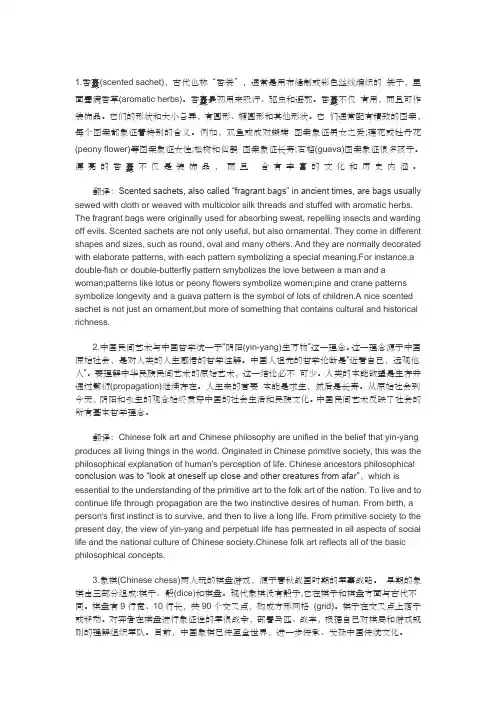
1.香囊(scented sachet),古代也称“香袋”,通常是用布缝制或彩色丝线编织的袋子,里面塞满香草(aromatic herbs)。
香囊最初用来吸汗、驱虫和避邪。
香囊不仅有用,而且可作装饰品。
它们的形状和大小各异,有圆形、椭圆形和其他形状。
它们通常配有精致的图案,每个图案都象征着特别的含义。
例如,双鱼或成对蝴蝶图案象征男女之爱;莲花或牡丹花(peony flower)等图案象征女性;松树和仙鹤图案象征长寿;石榴(guava)图案象征很多孩子。
漂亮的香囊不仅是装饰品,而且含有丰富的文化和历史内涵。
翻译:Scented sachets, also called “fragrant bags” in ancient times, are bags usually sewed with cloth or weaved with multicolor silk threads and stuffed with aromatic herbs. The fragrant bags were originally used for absorbing sweat, repelling insects and warding off evils. Scented sachets are not only useful, but also ornamental. They come in different shapes and sizes, such as round, oval and many others. And they are normally decorated with elaborate patterns, with each pattern symbolizing a special meaning.For instance,a double-fish or double-butterfly pattern smybolizes the love between a man and a woman;patterns like lotus or peony flowers symbolize women;pine and crane patterns symbolize longevity and a guava pattern is the symbol of lots of children.A nice scented sachet is not just an ornament,but more of something that contains cultural and historical richness.2.中国民间艺术与中国哲学统一于“阴阳(yin-yang)生万物”这一理念。
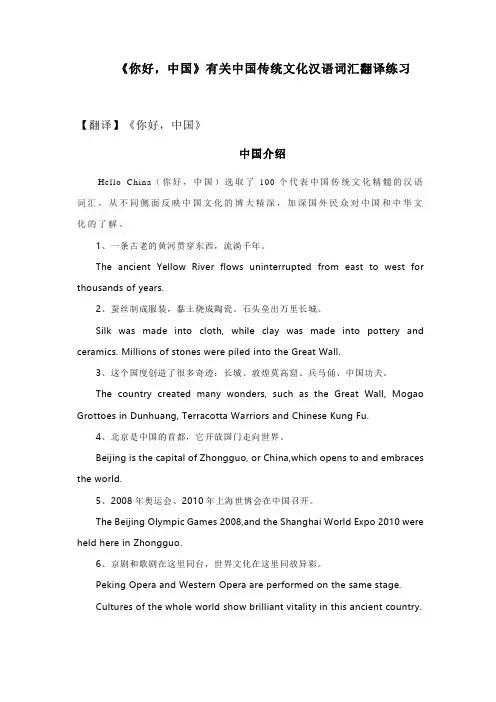
《你好,中国》有关中国传统文化汉语词汇翻译练习【翻译】《你好,中国》中国介绍Hello China(你好,中国)选取了100个代表中国传统文化精髓的汉语词汇,从不同侧面反映中国文化的博大精深,加深国外民众对中国和中华文化的了解。
1、一条古老的黄河贯穿东西,流淌千年。
The ancient Yellow River flows uninterrupted from east to west for thousands of years.2、蚕丝制成服装,黏土烧成陶瓷。
石头垒出万里长城。
Silk was made into cloth, while clay was made into pottery and ceramics. Millions of stones were piled into the Great Wall.3、这个国度创造了很多奇迹:长城、敦煌莫高窟、兵马俑、中国功夫。
The country created many wonders, such as the Great Wall, Mogao Grottoes in Dunhuang, Terracotta Warriors and Chinese Kung Fu.4、北京是中国的首都,它开放国门走向世界。
Beijing is the capital of Zhongguo, or China,which opens to and embraces the world.5、2008年奥运会、2010年上海世博会在中国召开。
The Beijing Olympic Games 2008,and the Shanghai World Expo 2010 were held here in Zhongguo.6、京剧和歌剧在这里同台,世界文化在这里同放异彩。
Peking Opera and Western Opera are performed on the same stage.Cultures of the whole world show brilliant vitality in this ancient country.7、这就是中国!希望你可以了解她,欣赏她,爱上她。
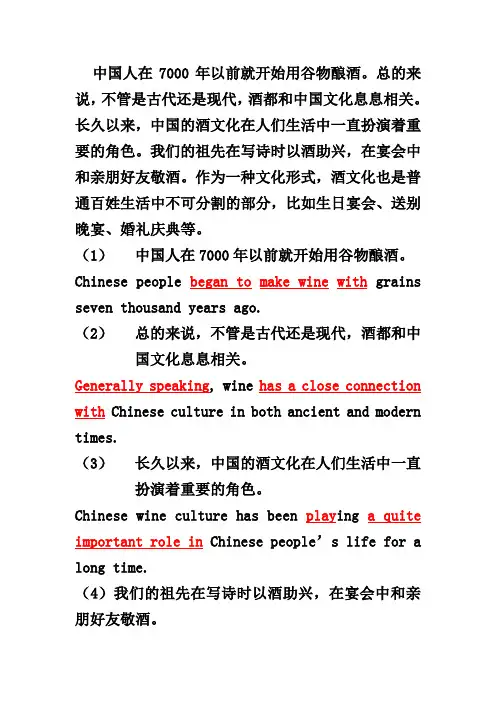
中国人在7000年以前就开始用谷物酿酒。
总的来说,不管是古代还是现代,酒都和中国文化息息相关。
长久以来,中国的酒文化在人们生活中一直扮演着重要的角色。
我们的祖先在写诗时以酒助兴,在宴会中和亲朋好友敬酒。
作为一种文化形式,酒文化也是普通百姓生活中不可分割的部分,比如生日宴会、送别晚宴、婚礼庆典等。
(1)中国人在7000年以前就开始用谷物酿酒。
Chinese people began to make wine with grains seven thousand years ago.(2)总的来说,不管是古代还是现代,酒都和中国文化息息相关。
Generally speaking, wine has a close connection with Chinese culture in both ancient and modern times.(3)长久以来,中国的酒文化在人们生活中一直扮演着重要的角色。
Chinese wine culture has been play ing a quite important role in Chinese people’s life for a long time.(4)我们的祖先在写诗时以酒助兴,在宴会中和亲朋好友敬酒。
Our Chinese ancestors used to enjoy themselves by drinking wine while writing poetry, or to make a toast to their relatives and friends during a feast.(5)作为一种文化形式,酒文化也是普通百姓生活中不可分割的部分,比如生日宴会、送别晚宴、婚礼庆典等。
Wine culture, as a kind of culture form, is also an inseparable part in the life of ordinary Chinese people such as birthday party, farewell dinner, wedding, etc.1、中国书法 Chinese Calligraphy中国书法历史悠久,它不仅是汉字的传统书写形式,也是体现自我修养和自我表达的艺术。
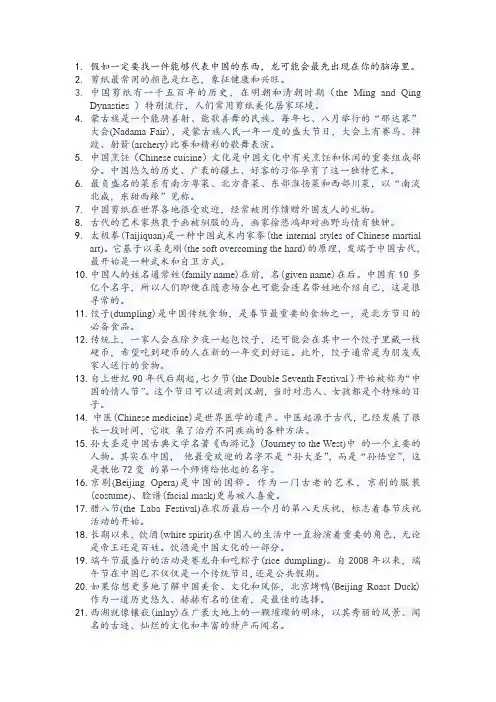
1.假如一定要找一件能够代表中国的东西,龙可能会最先出现在你的脑海里。
2.剪纸最常用的颜色是红色,象征健康和兴旺。
3.中国剪纸有一千五百年的历史,在明朝和清朝时期(the Ming and QingDynasties )特别流行,人们常用剪纸美化居家环境。
4.蒙古族是一个能骑善射、能歌善舞的民族。
每年七、八月举行的“那达慕”大会(Nadama Fair),是蒙古族人民一年一度的盛大节日,大会上有赛马、摔跤、射箭(archery)比赛和精彩的歌舞表演。
5.中国烹饪(Chinese cuisine)文化是中国文化中有关烹饪和休闲的重要组成部分。
中国悠久的历史、广袤的疆土、好客的习俗孕育了这一独特艺术。
6.最负盛名的菜系有南方粤菜、北方鲁菜、东部淮扬菜和西部川菜,以“南淡北咸,东甜西辣”见称。
7.中国剪纸在世界各地很受欢迎,经常被用作馈赠外国友人的礼物。
8.古代的艺术家热衷于画被驯服的马,画家徐悲鸿却对画野马情有独钟。
9.太极拳(T aijiquan)是一种中国武术内家拳(the internal styles of Chinese martialart)。
它基于以柔克刚(the soft overcoming the hard)的原理,发端于中国古代,最开始是一种武术和自卫方式。
10.中国人的姓名通常姓(family name)在前,名(given name)在后。
中国有10多亿个名字,所以人们即便在随意场合也可能会连名带姓地介绍自己,这是很寻常的。
11.饺子(dumpling)是中国传统食物,是春节最重要的食物之一,是北方节日的必备食品。
12.传统上,一家人会在除夕夜一起包饺子,还可能会在其中一个饺子里藏一枚硬币,希望吃到硬币的人在新的一年交到好运。
此外,饺子通常是为朋友或家人送行的食物。
13.自上世纪90年代后期起,七夕节(the Double Seventh Festival)开始被称为“中国的情人节”。
一、京剧被誉为“东方歌剧”,是地道的中国国粹。
它起源于中国多种古老的地方戏剧,特别是南方的“徽班”。
到了19 世纪末,京剧形成并成为中国最大的戏曲剧种。
京剧是综合性表演艺术,集唱(歌唱)、念(念白)、做(表演)、打(武)、舞(舞蹈)为一体,通过程式化的表演手段,叙述故事,刻画人物。
角色主要分生(男性)、旦(女性)、净(男性)、丑(男性女性皆有)四大行当。
(1) 京剧被誉为“东方歌剧”,是地道的中国国粹。
Praised as“Oriental Opera”, Beijing Opera isa genuine national quintessence of China.(2) 它起源于中国多种古老的地方戏剧,特别是南方的“徽班”。
It originated from many kinds of ancient local operas, especially huiban in southern China. (3) 到了 19 世纪末,京剧形成并成为中国最大的戏曲剧种。
At the end of the 19th Century, Beijing Opera evolved and took shape, becoming the greatest kind of opera in China.(4) 京剧是综合性表演艺术,集唱(歌唱)、念(念白)、做(表演)、打(武)、舞(舞蹈)为一体,通过程式化的表演手段,叙述故事,刻画人物。
Beijing Opera is a blend of performing arts---song, speech, performance, acrobatic fighting and dance. Beijing Opera portrays and narrates the plot and characters through stylized acting.(5) 角色主要分生(男性)、旦(女性)、净(男性)、丑(男性女性皆有)四大行当。
一、2013 年 6 月20 日在中国各地,据估计60 万儿童和他们的老师观看了宇航员王亚平在距离地球300 公里的上空所讲授的科学课。
王亚平与她的两个同事乘坐天宫一号实验舱(theTiangon-1 laboratory module) 执行为期两周的任务。
在课上进行了一系列太空的物理演示。
在有些演示中还对比了在地球上重力环境下同样的实验。
这堂物理课不仅让孩子们享受了一堂知识与乐趣兼具的物理课,也显示了我国通信科技的前进。
1. 2013 年6 月20 日在中国各地,据估计60 万儿童和他们的老师观看了宇航员王亚平在距离地球300 公里的上空所讲授的科学课。
On June 20, 2013, an estimated 600 thousand school children and their teachers across China watched a science lesson taught from 300km above the Earth by astronaut Wang Yaping.2. 王亚平与她的两个同事乘坐天宫一号实验舱(theTiangon-1 laboratory module) 执行为期两周的任务。
Wang is aboard the Tiangong-1 Laboratory Module with her two crewmates for a two-week mission.3. 在课上进行了一系列太空的物理演示。
Her lessons were a series of physics demonstrations in the space.4. 在有些演示中还对比了在地球上重力环境下同样的实验。
In some demonstrations, she compared with the same experiment under the one-gravity environment on the earth.5. 这堂物理课不仅让孩子们享受了一堂知识与乐趣兼具的物理课,也显示了我国通信科技的前进。
2023中国文化艺术英语四级翻译练习题2023中国文化艺术英语四级翻译练习题请将下面这段话翻译成英文:昆曲(Kunqu Opera)于江苏昆山地区,至今已有600多年的历史,它是中国戏曲最古老的'存在形式之一。
昆曲有一个完好的表演体系并且有自己独特的腔调。
昆曲在明朝初期得到开展。
从16到18世纪,它一直主宰着中国戏曲。
此外,昆曲还影响了许多其他的中国戏曲形式。
今天,昆曲仍然在中国的一些大城市被进展表演,受到了许多人的喜欢。
参考翻译:Kunqu Opera originated in the Kunshan region of Jiangsu. It is one of the oldest existing forms of Chinese operas with a history of more than 600 years. Kunqu Opera has a plete system of acting characterized by its own distinctive tunes. During the early Ming Dynasty, Kunqu Opera got developed and it dominated Chinese theatre from the 16th to the 18th century. In addition, Kunqu Opera has influenced many other Chinese theatre forms. Today, Kunqu Opera is stillplayed in some major cities of China and enjoys a popularity among many people.1.至今已有600多年的历史:“已有600多年的历史”可译为with a history of more than 600 years,其中with ahistory of意表示“有...的历史”,more than表示“多于,超过”。
Translation exercises1圆明园(Yuanmingyuan)以其传奇的魅力和与中国现代历史的联系而世界闻名。
在它在鼎盛时期誉时为“万园之园”和“东方的凡尔赛宫”( Versailles of the East)。
这是一个由清朝(Qing Dynasty)五个皇帝展开监督并多次辛苦建立起来的皇家避暑胜地。
圆明园不仅因美丽而出名,同时它也是一个拥有大量的文化宝藏的国家博物馆。
法国作家维克多·雨果(Victor Hugo)曾经说过,“巴黎圣母院(Notre Dame in Paris)所有的宝藏也无法与东方那巨大而宏伟的博物馆——圆明园相提并论。
”Key:Yuanmingyuan is renowned throughout the world for its fabled charms and association with Chinese modern history, extolled as the "Garden of Gardens" and the "Versailles of the East" during its heyday. It was an imperial summer resort painstakingly built and repeatedly expanded under the personal supervision of five emperors of the Qing Dynasty.Yuanmingyuan was not only famed for its beauty. It was also an imperial museum with a vast collection of cultural treasures. The French writer Victor Hugo once remarked, "With all its treasures, Notre Dame in Paris is no match for Yuanmingyuan, that enormous and magnificent museum in the East."2. 在中国,有许多不同种类的食品。
英语专业八级考试翻译练习(共10篇,附答案)英语专业八级考试翻译练习(1)TRANSLATION (60 MIN)SECTION A: CHINESE TO ENGLISHTranslate the following underlined text into English.简.奥斯丁的小说都是三五户人家居家度日,婚恋嫁娶的小事。
因此不少中国读者不理解她何以在西方享有那么高的声誉。
但一部小说开掘得深不深,艺术和思想是否有过人之处,的确不在题材大小。
有人把奥斯丁的作品比作越咀嚼越有味道的橄榄。
这不仅因为她的语言精彩,并曾对小说艺术的发展有创造性的贡献,也因为她的轻快活泼的叙述实际上并不那么浅白,那么透明。
史密斯夫人说过,女作家常常试图修正现存的价值秩序,改变人们对“重要”和“不重要”的看法。
也许奥斯丁的小说能教我们学会转换眼光和角度,明察到“小事”的叙述所涉及的那些不小的问题。
SECTION B ENGLISH TO CHINESETranslate the following underlined text into Chinese.I, by comparison, living in my overpriced city apartment, walking to work past putrid sacks of street garbage, paying usurious taxes to local and state governments I generally abhor, I am rated middle class. This causes me to wonder, do the measurement make sense? Are we measuring only that which is easily measured---the numbers on the money chart --- and ignoring values more central to the good life? For my sons there is of course the rural bounty of fresh-grown vegetables, line-caught fish and the shared riches of neighbours’ orchards and gardens. There is the unpaid baby-sitter for whose children my daughter-in-law baby-sits in return, and neighbours who barter their skills and labour. But more than that, how do you measure serenity? Sense if self?I don’t want to idealize life in small places. There are times when the outside world intrudes brutally, as when the cost of gasoline goes up or developers cast their eyes on untouched farmland. There are cruelties, there is intolerance, there are all the many vices and meannesses in small places that exist in large cities. Furthermore, it isharder to ignore them when they cannot be banished psychologically to another part of town or excused as the whims of alien groups ---when they have to be acknowledged as “part of us.”Nor do I want to belittle the opportunities for small decencies in cities ---the eruptions of one-stranger-to-another caring that always surprise and delight. But these are, sadly, more exceptions than rules and are often overwhelmed by the awful corruptions and dangers that surround us.英语专业八级考试翻译练习(2)TRANSLATION (60 MIN)SECTION A: CHINESE TO ENGLISHTranslate the following underlined text into English.近读报纸,对国内名片和请柬的议论颇多,于是想起客居巴黎时经常见到的法国人手中的名片和请柬,随笔记下来,似乎不无借鉴之处。
古代文化6-10单元翻译练习jUnit 61. 不论什么时候在任何国家,婚礼都被认为是一个人一生中最重要的仪式。
虽然中国的婚俗在不断地变化与发展,但是婚礼中创造的庄重、热情、欢乐和吉祥的气氛却一直未变。
因为中国拥有56个民族,因此婚俗也成为民族文化中一个重要的组成部分。
随着社会的进步和人们思想的改变,在中国自由恋爱日渐流行。
因此目前的婚礼习俗已不如传统的那样复杂。
【译文】At all times and in all countries, the wedding ceremony is con sidered to be the greatest ritual of anyone’s entire life. Although Chinese marriage customs are changing and developing all the time, the atmosphere created during the wedding is unchanged — being ceremonious/solemn, enthusiastic, joyful and auspicious(吉祥的). Because China consists of 56 ethnic groups, Chinese marriage customs are an important part of the country's folk/national culture. However, along with the progress of society and the transformation of people's mind, free love has become increasingly popular in China, so current Chinese marriage customs are not as complicated as the traditional ones.2. 中国龙是吉祥的(auspicious)生灵,象征着力量、智慧、好运和掌控风和水的威力。
一、京剧被誉为“东方歌剧”,是地道的中国国粹。
它起源于中国多种古老的地方戏剧,特别是南方的“徽班”。
到了19 世纪末,京剧形成并成为中国最大的戏曲剧种。
京剧是综合性表演艺术,集唱(歌唱)、念(念白)、做(表演)、打(武)、舞(舞蹈)为一体,通过程式化的表演手段,叙述故事,刻画人物。
角色主要分生(男性)、旦(女性)、净(男性)、丑(男性女性皆有)四大行当。
(1) 京剧被誉为“东方歌剧”,是地道的中国国粹。
Praised as“Oriental Opera”, Beijing Opera is a genuine national quintessence of China.(2) 它起源于中国多种古老的地方戏剧,特别是南方的“徽班”。
It originated from many kinds of ancient local operas, especially huiban in southern China.(3) 到了19 世纪末,京剧形成并成为中国最大的戏曲剧种。
At the end of the 19th Century, Beijing Opera evolved and took shape, becoming the greatest kind of opera in China.(4) 京剧是综合性表演艺术,集唱(歌唱)、念(念白)、做(表演)、打(武)、舞(舞蹈)为一体,通过程式化的表演手段,叙述故事,刻画人物。
Beijing Opera is a blend of performing arts---song, speech, performance, acrobatic fighting and dance. Beijing Opera portrays and narrates the plot and characters through stylized acting.(5) 角色主要分生(男性)、旦(女性)、净(男性)、丑(男性女性皆有)四大行当。
The main types of roles in Beijing Opera are sheng (male), dan (young female), jing (painted face, male), and chou (clown, either male or female).二、道教是中国土生土长的宗教。
创始人是春秋末期的哲学家、思想家老子。
道教以老子所著的《道德经》为主要经典。
道教主张“重人贵生”, 崇尚清静无为,修身养性。
“道可道,非常道。
名可名,非常名。
无名天地之始;有名万物之母。
故常无,欲以观其妙;常有,欲以观其徼(jiao4)”便是老子的至理名言。
(1) 道教是中国土生土长的宗教。
创始人是春秋末期的哲学家、思想家老子。
Taoism first originated in China. The founder of Taoism is Lao-zi, a philosopher and thinker who lived in the late Spring and Autumn Period.(2) 道教以老子所著的《道德经》为主要经典。
Tao Te Ching, written by Lao-zi, is considered to be the main Taoist classic.(3) 道教主张“重人贵生”, 崇尚清静无为,修身养性。
Taoism advocates the value of a human being’s life, recommends the discarding of all desires and worries from one’s mind, and encourages the cultivation of moral character and the nourishment of human nature.(4) “道可道,非常道。
名可名,非常名。
The following is an example of Lao-zi’s wise saying: The way that can be told of is not an unvarying way; the names that can be named are not unvarying names.(5) 无名天地之始;有名万物之母。
It was from the nameless that Heaven and Earth sprang; the named is but the mother that rears the ten thousand creatures, each after its kind.(6) 故常无,欲以观其妙;常有,欲以观其徼(jiao4)”便是老子的至理名言。
Truly, only he that rids himself forever of desire can see the secret essences; He that has never rid himself of desire can see only the outcomes.三、中国成语是汉语中意义完整的表示一般概念的固定词组或短语。
“成语”中的“成”既是约定俗成。
成语是比词大而语法功能又相当于词的语言单位。
绝大多数的中国成语由四个汉字组成,例如:自强不息、青出于蓝、厚积薄发。
成语主要从民间谚语、古代文学作品、诗歌、寓言、典故、名言警句等方面提炼而成。
成语是汉语语言中精炼而又富有生命力的一部分。
(1) 中国成语是汉语中意义完整的表示一般概念的固定词组或短语。
Chinese idioms refer to comprehensive and integrated fixed phrases and expressions.(2) “成语”中的“成”既是约定俗成。
Idioms are established and accepted by constant usage and common practice.(3) 成语是比词大而语法功能又相当于词的语言单位。
An idiom is a language unit that is larger than a word, but has the same grammatical function as a word. (4) 绝大多数的中国成语由四个汉字组成,例如:自强不息、青出于蓝、厚积薄发。
Most Chinese idioms consist of four characters, for example,ziqiangbuxi(make unremitting efforts toimprove oneself), qingchuyulan (bluer than indigo), and houjibofa (success comes with time and effort). (5) 成语主要从民间谚语、古代文学作品、诗歌、寓言、典故、名言警句等方面提炼而成。
Idioms are extracted from folk proverbs, ancient works of literature, poems, fables, allusions, and well-known sayings.(6) 成语是汉语语言中精炼而又富有生命力的一部分。
Idioms are a part of the Chinese language that are concise and have great vitality.四、中国是丝绸的故乡。
栽桑、养蚕、缫(sao1)丝、织绸是中国古代人民的伟大发明。
商周时期丝绸的生产技术就已发展到相当高的水平。
西汉时张骞出使西域,把中原与波斯湾、地中海紧密联系起来,开辟了中外交流贸易的新纪元。
从此中国的丝绸以其卓越的品质、精美的花色和丰富的文化内涵闻名于世,成为中国文化的象征,东方文明的使者。
(1) 中国是丝绸的故乡。
China is the home of silk.(2) 栽桑、养蚕、缫(sao1)丝、织绸是中国古代人民的伟大发明。
Mulberry planting, sericulture, silk reeling and silk weaving are all great inventions of the ancient Chinese.(3) 商周时期丝绸的生产技术就已发展到相当高的水平。
As early as the Shang and Zhou Dynasties, Chinese people’s silk-weaving techniques had reached an extremely high level.(4) 西汉时张骞出使西域,把中原与波斯湾、地中海紧密联系起来,开辟了中外交流贸易的新纪元。
During the Western Han Dynasty, Zhang Qian, an outstanding diplomat, traveled around central Asia and connected China with the Persian Gulf and the Mediterranean, opening up a new era of Sino-foreign trade, exchange and communication.(5) 从此中国的丝绸以其卓越的品质、精美的花色和丰富的文化内涵闻名于世,成为中国文化的象征,东方文明的使者。
From then on,China’s silk became well known for its extraordinary quality, exquisite design and color, and abundant culture connotations. Since then, Chinese silk has be en accepted as a symbol of Chinese cultureand the emissary of oriental civilization.五、中国园林是把人造的山水、植物、建筑等与自然地貌有机结合的环境艺术,是我国古代建筑艺术的珍宝。
其建造原则是“妙极自然,宛自天开”。
游赏中国古典园林,能充分领略“假自然之景,创山水真趣”的园林意境。
在世界三大园林体系中,中国园林历史悠久、内涵丰富,被誉为世界造园史上的渊源之一。